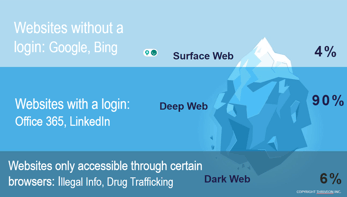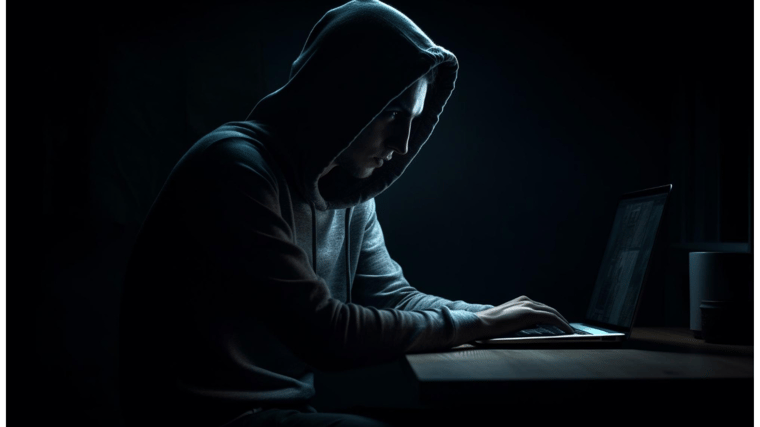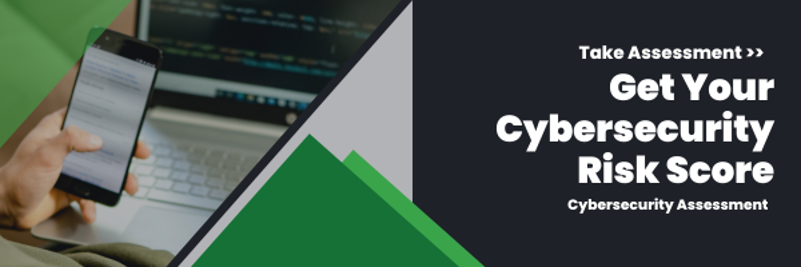The internet is a vast, interconnected network we use daily for various reasons: communication, research, entertainment, shopping and business. This surface web is the tip of the iceberg, where websites are indexed by search engines and easily reviewed with traditional browsers.
However, lurking beneath the surface web is a mysterious, complex and often misunderstood realm known as “the dark web.” Understanding the dark web, who uses it and its benefits and drawbacks can help address the evolving landscape of privacy, security and online freedom.
What Is the Dark Web?
If the surface web is the tip of the iceberg, the next layer is “the deep web.” This accounts for about 80% of the entire internet and includes web pages not indexed by search engines; most of the content we use daily is located on the deep web behind paywalls, authentication forms and login credentials, like online banking accounts, payment portals, login pages, subscription services, email accounts and databases.
The dark web is a subset of the deep web and goes a step further: it’s a part of the internet that is intentionally hidden and inaccessible through standard web browsers like Google Chrome or Mozilla Firefox. Instead, it can only be accessed using specialized software that you keep anonymous. The most popular example is The Onion Router, or Tor. From there, people can use dark search engines like DuckDuckGo, Torch or Ahmia to find and access dark websites.
The dark web began in March 2000 with the launch of Freenet, a network that allowed users to communicate and exchange files anonymously. This eventually led to the U.S. Naval Research Laboratory creating the Tor Project, which was released in 2002.
The dark web is all about anonymity. For example, Tor uses onion routing, which routes traffic through multiple encrypted global servers, or nodes, to hide IP addresses and provide private browsing that is almost impossible to trace. All domains under the Tor network end in .onion instead of .com, .net, .edu, .gov or .org, as a nod to its many layers of encryption. Also, unlike easy-to-remember websites on the surface or deep web, dark web websites are often a string of random letters and numbers.
Who Uses the Dark Web?
Knowing exactly who uses the dark web or how big it is can be tricky to calculate due to its private nature and because dark websites offering illegal goods and services often pop up and disappear quickly. However, it’s estimated that the dark web takes up about 6% of the entire internet, and it has over 2 million users every day with 26% from North America. Although the dark web has a nefarious reputation for criminals, not everyone who uses it is bad. Users include:
- Privacy advocates: Some use the dark web to protect their privacy and anonymity while communicating and sharing information (sometimes sensitive information) without fear of reprisal, like whistleblowers, journalists and activists. Others just don’t want to share any information online or have their data tracked.
- Cybersecurity experts: Cybersecurity experts and researchers can navigate the dark web to study how to combat cyber attacks and protect sensitive data.
- Law enforcement and intelligence agencies: Law enforcement and intelligence agencies like the CIA use the dark web to either monitor and shut down illegal operations or take in tips from anonymous sources.
- Criminals and hackers: The dark is notoriously used for criminal activity. It can host forums and marketplaces where hackers can exchange information, tools and stolen data for payment, often in the form of cryptocurrency like bitcoin.
Why Do People Use the Dark Web?
Contrary to popular belief, accessing and using the dark web is completely legal; what people do with it can make it illegal. Even though the dark web has a bad reputation, it can serve some legitimate purposes.
The main point of the dark web, as we mentioned above, is to provide privacy and anonymity. Users can access ad-free and track-free dark websites, social media, news outlets like ProPublica, academic research, forums and chat boards, niche content and email to get information and communicate without revealing their IP addresses or other identifying information. This has attracted individuals like whistleblowers and activists seeking to maintain their online privacy without being tracked or identified. WikiLeaks and Anonymous are famous examples of the aforementioned groups.
Another appealing feature of the dark web is its unregulated environment. Since the dark web operates outside the traditional boundaries of the visible web, it lacks the oversights and regulations present on the surface web. Although this makes it a sanctuary for free speech and privacy, especially for people living in repressive regimes with government censorship and surveillance, it is also a hotspot for illegal trade, including drugs, weapons, counterfeit items, pornography and even cyber attacks.
Hackers can sell access to stolen personally identifiable information (PII), like names, addresses, birth dates, phone numbers, email accounts, social media profiles, Social Security Numbers and login information. Financial data like stolen credit cards, online banking credentials, banking records and hacked subscription accounts can also be bought, as can medical data like medical history and records, prescriptions and billing information. Finally, forged data like fake passports diplomas and stolen driver’s licenses and IDs are for sale.
Pros and Cons of the Dark Web
The dark web offers both challenges and opportunities for society:
- The dark web is a secure platform for whistleblowers to contact journalists and expose wrongdoing, be it corruption or murder. However, some secrets are of national security and arguably shouldn’t be revealed to the public.
- On that note, the dark web raises significant debates about balancing individual privacy and national security. There is a fine line between protecting liberal principles and free expression versus identifying and stopping criminals.
- Law enforcement struggles to police the dark web due to its anonymity and encryption features. With a lack of regulation by authorities, the dark web is littered with malware, phishing, fraud and scams, making it difficult to distinguish “safe” websites from dangerous ones.
How to Protect Yourself If You Use the Dark Web
If you do venture onto the dark web, don’t surf it like you would on the surface or deep web. Keep yourself, your identity and your data safe with these tips:
- Use a virtual private network (VPN) for extra security
- Never visit any dark sites without first confirming that they are authentic
- Follow cybersecurity best practices
- Never give away any personal information
- Implement antivirus and antimalware software
- Don’t click on suspicious links or download anything suspicious
- Utilize tools that can scan the dark web for your PII, like Aura
Thriveon Can Help Protect You
If you’re unsure where to stay with protecting your data and maintaining a robust security, consider Thriveon. Our managed IT and cybersecurity compliance services can help keep your assets off the dark web.
Schedule a meeting with us today and find out how we can help protect your business. You can also take our cybersecurity risk assessment to discover your current vulnerabilities.

